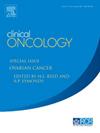Oncotype DX乳腺DCIS评分测试:对放疗建议和患者决策焦虑的影响
IF 3.2
3区 医学
Q2 ONCOLOGY
引用次数: 0
摘要
导管原位癌(DCIS)的治疗包括手术后放疗(RT),以降低局部复发(LR)的风险,尽管RT可能对一些患者过度治疗。Oncotype DX乳腺DCIS评分®测试是一种基因组测试,可提供个性化的LR风险估计。本研究评估了Oncotype测试对RT推荐、患者焦虑和决策冲突的影响。材料和方法邀请年龄≥45岁、DCIS≥25mm且行保乳手术的女性参与研究。在Oncotype检测之前,提出了最初的RT建议和10年LR风险预测。在Oncotype测试后,记录最终的RT建议。患者在接受Oncotype结果前后分别完成决策冲突和焦虑问卷。结果共纳入71例受试者,中位年龄59岁。90%的DCIS为中重度,中位尺寸为12mm。在收到Oncotype结果后,肿瘤学家改变了28%(20/71)病例的放疗建议;21%的患者从接受放射治疗变为不接受放射治疗,7%的患者从不接受放射治疗变为接受放射治疗。在79%的病例中,肿瘤学家的LR估计高于Oncotype预测。在Oncotype测试后,患者的决策冲突和焦虑减少。结论Oncotype试验改变了近三分之一患者关于辅助放疗的治疗建议。此外,该分析与减少治疗相关的决策冲突和患者的焦虑有关。肿瘤学家的LR风险预测高于Oncotype预测,这突出了需要额外的工具来帮助决策。本文章由计算机程序翻译,如有差异,请以英文原文为准。
Oncotype DX Breast DCIS Score® Test: Impact on Radiotherapy Recommendations and Patient Decisional Anxiety
Aims
Treatment for Ductal Carcinoma in Situ (DCIS) includes surgery followed by radiotherapy (RT) to reduce local recurrence (LR) risk, though RT may be overtreatment for some patients. The Oncotype DX Breast DCIS Score® test is a genomic test that provides individualised LR risk estimates. This study evaluates the impact of the Oncotype test on RT recommendations, patient anxiety and decisional conflict.
Material and methods
Women aged ≥45 years with DCIS up to 25mm treated with breast-conserving surgery were invited to participate. Initial RT recommendations and 10-year LR risk predictions were made before Oncotype testing. Post Oncotype testing, final RT recommendations were recorded. Patients completed decisional conflict and anxiety questionnaires before and after receiving Oncotype results.
Results
A total of 71 participants were included with a median age of 59. Ninety percent of DCIS was intermediate/high-grade with a median size of 12mm. Oncologists changed RT recommendations in 28% (20/71) of cases after receiving the Oncotype result; 21% changed from RT to no RT and 7% from no RT to RT. In 79% of cases, the oncologists’ LR estimates were higher than Oncotype predictions. Post Oncotype testing, patient decisional conflict and anxiety decreased.
Conclusion
The Oncotype test changed treatment recommendations regarding adjuvant RT in almost a third of patients. Additionally, the assay was associated with reduced treatment-related decisional conflict and anxiety in patients. LR risk predictions by oncologists were higher than the Oncotype predictions highlighting a need for additional tools to aid decision-making.
求助全文
通过发布文献求助,成功后即可免费获取论文全文。
去求助
来源期刊

Clinical oncology
医学-肿瘤学
CiteScore
5.20
自引率
8.80%
发文量
332
审稿时长
40 days
期刊介绍:
Clinical Oncology is an International cancer journal covering all aspects of the clinical management of cancer patients, reflecting a multidisciplinary approach to therapy. Papers, editorials and reviews are published on all types of malignant disease embracing, pathology, diagnosis and treatment, including radiotherapy, chemotherapy, surgery, combined modality treatment and palliative care. Research and review papers covering epidemiology, radiobiology, radiation physics, tumour biology, and immunology are also published, together with letters to the editor, case reports and book reviews.
 求助内容:
求助内容: 应助结果提醒方式:
应助结果提醒方式:


